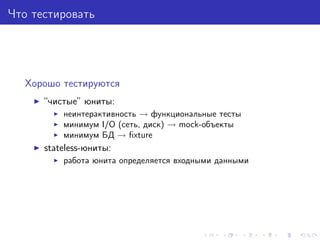1 of 7
Downloaded 12 times







Ad
Recommended
Покрывая мили на пути к Миллениуму; Introduction of the XO in Russia



Покрывая мили на пути к Миллениуму; Introduction of the XO in RussiaHarrie Vollaard Покрывая мили на пути к Миллениуму; Introduction of the XO in Russia
одесские подъезды



одесские подъездыguestc2f6bc23 Социологическое исследование с проекта Урбан студия "Место, увиденное издалека. Одесса - Тель Авив"(Urban Studio 2009)
концепция региональной информатизации до 2010 года



концепция региональной информатизации до 2010 годаVictor Gridnev концепция региональной информатизации до 2010 года
Иван Иноземцев — Fantom



Иван Иноземцев — FantomYury Yurevich Иван Иноземцев рассказывает о языке Fantom для платформ JVM и .NET и IDE для Fantom написанное на нём же на базе Eclispe
Ad
More Related Content
What's hot (20)
Покрывая мили на пути к Миллениуму; Introduction of the XO in Russia



Покрывая мили на пути к Миллениуму; Introduction of the XO in RussiaHarrie Vollaard Покрывая мили на пути к Миллениуму; Introduction of the XO in Russia
одесские подъезды



одесские подъездыguestc2f6bc23 Социологическое исследование с проекта Урбан студия "Место, увиденное издалека. Одесса - Тель Авив"(Urban Studio 2009)
концепция региональной информатизации до 2010 года



концепция региональной информатизации до 2010 годаVictor Gridnev концепция региональной информатизации до 2010 года
Viewers also liked (10)
Иван Иноземцев — Fantom



Иван Иноземцев — FantomYury Yurevich Иван Иноземцев рассказывает о языке Fantom для платформ JVM и .NET и IDE для Fantom написанное на нём же на базе Eclispe
ekb.py: KISS REST API



ekb.py: KISS REST APIYury Yurevich This document summarizes best practices for designing a REST API, including making the API easy to use, read, and extend. It provides real-world examples and discusses tools for documentation, validation, and JSON generation. Key recommendations include using nouns for resources, explicit versioning, token-based or OAuth authentication, and representing resources as complete URLs.
Almost Success Story: Unix to Linux migration



Almost Success Story: Unix to Linux migrationYury Yurevich Topic in russian on migration from proprietary Unix (SCO) to free Linux.
SQLAlchemy Seminar



SQLAlchemy SeminarYury Yurevich SQLAlchemy is a Python SQL toolkit and object relational mapper that allows developers to work with relational databases in Python. It provides a way to generate SQL expressions programmatically and functions as an object relational mapper, allowing Python classes to be mapped to database tables. SQLAlchemy aims to provide a full suite of tools for working with relational databases directly or via an object-relational abstraction layer.
Александр Гладыш — Lua



Александр Гладыш — LuaYury Yurevich Александр Гладыш рассказывает о достоинствах, особенностях и недостатках Lua, предупреждает о типичных ошибках начинающих Lua-программистов.
About Python



About PythonYury Yurevich Small presentation about Python in generic with separate accents for managers and developers.
Building data flows with Celery and SQLAlchemy



Building data flows with Celery and SQLAlchemyRoger Barnes Reporting and analysis systems rely on coherent and reliable data, often from disparate sources. To that end, a series of well established data warehousing practices have emerged to extract data and produce a consistent data store.
This talk will look at some options for composing workflows using Python. In particular, we'll explore beyond Celery's asynchronous task processing functionality into its workflow (aka Canvas) system and how it can be used in conjunction with SQLAlchemy's architecture to provide the building blocks for data stream processing.
Inter-process data exchange in Python



Inter-process data exchange in PythonYehor Nazarkin This document discusses various methods for communication between processes in Python, including client-server architectures, message queues, serialization, multiprocessing pipes, forking, and memory-mapped files. It provides code examples and performance results for different serialization formats like JSON, msgpack, and pickle. Memory usage is also compared for multiprocessing pipes, forking, and memory mapping for inter-process communication.
Ad



























